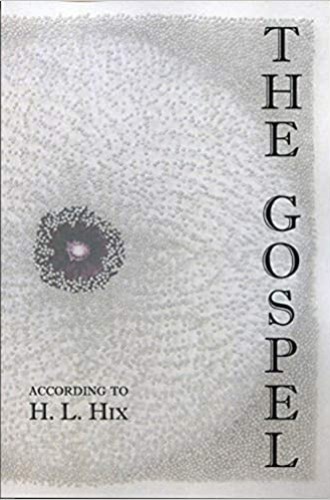Can H. L. Hix improve on Matthew, Mark, Luke, and John?
An odd, charming gospel account that draws from dozens of sources
The canonical Gospels form the conventional shape of the church’s story of Jesus for traditional use in worship and study. In composing The Gospel, poet and translator H. L. Hix drew content from those four Gospels—and from dozens of other texts. He lists 48 sources, including Melchizedek, the Concept of Our Great Power, the Gospel of Thomas, the letter of Peter to Philip, the Revelation of Peter, and Manichaean Psalms of the Bema.
The authors of Matthew, Mark, Luke, and John might have collected stories of the life of Jesus, lifting pieces from some of them to weave into their own good news in the idiom of their time. Hix, who teaches philosophy and creative writing at the University of Wyoming, has done the same in our time. In his introduction to The Gospel, he lays out his dissatisfaction with existing translations, clarifies his motivations for composing the book, and outlines the shape of his corrective project.
Hix outlines five objections to the church’s canonical and translation traditions:
• The church’s canon limits its Gospels to four.
• The chosen four are usually read separately.
• They are treated as sacred objects rather than as examples of a legendary life story that has been told in other ways.
• They are translated into English with conventional and archaic word choices.
• Canonical ordering and traditional translations perpetuate gender bias.
Beginning with an invocation and ending with a benediction, The Gospel unfolds from Jesus’ birth to his resurrection without versification or chapter divisions. By erasing the canonical shape of the Gospels, Hix frees the gospel of Jesus from the cultural conditions of other times for greater identification with life in our time. He points out how the genealogy of 42 men and five women at the beginning of Matthew establishes the gospel within a patriarchy. The Gospel begins instead with stage-setting praise of life: “In the age of the soul will come the human who knows the great power.”
Hix’s word choices are aggressively colloquial. He deprioritizes collective church memory—preserved through generations in commentary, liturgy, and hymns—in favor of current American usage. The Greek word kurios, normally translated as “Lord,” becomes “boss.” Hix translates the Greek word daimon as “visitant,” explaining that while the English word demon connotes an evil presence, the Greek word is morally neutral. The NRSV translates Luke 4:33, “In the synagogue there was a man who had the spirit of an unclean demon.” Hix translates it, “In the synagogue one man, held by the breath of a toxic visitant.”
Hix writes that the Greek angelos once meant “a normal, mortal, earthly” messenger, so instead of angel he uses the word emissary. Disciple becomes apprentice. In a theologically and ecologically sensitive decision, the Greek word ouranos becomes “air” or “sky” rather than “heaven,” locating God not in another realm but within the earth’s biosphere, where birds fly.
The Gospel translates the Greek word christos not as Christ but as “salve.” Thus Luke 2:9 becomes, “An emissary of the boss confronted them and the glory of the boss shimmered around them. This day there is born for you in the city of David a preserver, who is the salve, the boss.”
Hix admits that masculine gendering of God and Jesus were used in the ancient languages, and he acknowledges the reasonable perpetuation of that gendering in English versions. Still, he presses ahead with principled translation protest, defying church tradition by altering gendered words. Instead of “father” for God, and “son” for Jesus, Hix uses the word fother (combining father and mother) for God and xon (pronounced “zun”) when son refers to Jesus. “Look to the birds in the sky that don’t plant or harvest or gather into barns, yet your fother in the sky feeds them.” When pronouns refer to God or to Jesus, Hix changes he to xe (pronounced “zhe”), him to xer, and his to xer or xers.
Thus another familiar scene reads like this in The Gospel: “Those who preceded and those who followed shouted out, Help. Blessed be the one who comes in the name of the boss, blessed be the coming of the realm of our father David. Help from the highest. Some of the Pharisees in the crowd said to xer, Teacher, tell your apprentices to shut up.”
Hix’s alterations and rearrangements turn faith’s central story into an adventure. Readers will bump over unfamiliar pronouns and run into snags of unexpected translations. They will wonder about the redaction of unfamiliar episodes and familiar scenes. Composed and edited by a single writer, these eccentric features eventually cohere into a rough composition that’s at once odd and charming: “Steady the feet of those who stumble and extend your hands to the sick. Feed the hungry, offer rest to the tired, help up those who want to stand, awaken those who sleep. The god is here, not there. Peace be with you.”





